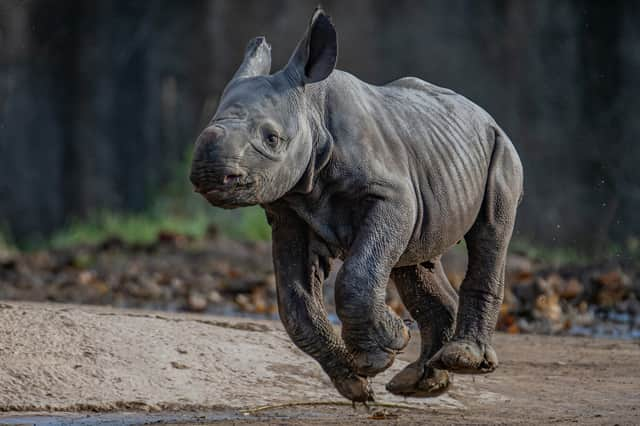Chester Zoo: Watch the moment an endangered baby rhino is born - captured on CCTV
and live on Freeview channel 276
This is the incredible moment the birth of an endangered baby rhino was captured on CCTV cameras at a UK zoo.
Keepers at Chester Zoo were left thrilled following the safe arrival of the eastern black rhino, which is one of the world's rarest mammals. The female calf was delivered onto a bed of soft sand by new mum Zuri on November 12 at 2.45pm following a 15-month pregnancy.
Advertisement
Hide AdAdvertisement
Hide AdRhino experts say it's unusual for a calf to be born in daylight, which gave keepers the unique opportunity to capture the special moment on camera. And heartwarming images of the new baby during its first few days of life show her sticking closely to her mum's side.
The zoo's rhino team manager Emma Evison said: “We'd been eagerly awaiting this birth for 15 long months and, as it's quite unusual for a rhino to give birth in daylight hours, we really didn’t expect it to happen right in front of us as we were going about our day. To be able to witness the calf safely entering the world, in front of our very own eyes, was just the most incredible privilege.
“What's most important now during these first few days is that mum Zuri and her new baby spend some time bonding and getting to know one another. So far, the pair have been inseparable and the little one is feeding regularly and already gaining in size and weight. She's very inquisitive and full of energy, which is just brilliant to see."
The eastern black rhino is listed as critically endangered by the International Union for the Conservation of Nature (IUCN). Fewer than 600 are now found across Kenya, Tanzania and Rwanda and it is said they face a 'very high chance' of becoming extinct in the wild. Conservationists believe the birth of a healthy calf will help global efforts to prevent the species from disappearing altogether.
Advertisement
Hide AdAdvertisement
Hide Ad

Emma added: “Sadly this is a species that, for more than century, has been hunted down and poached for its horn before being sold on the illegal wildlife markets. This precious newborn’s arrival is another positive step in safeguarding the species, which is what the endangered species breeding programme in European conservation zoos that we’re a leading part of is striving to do. This programme has already showed huge success, with a group of rhinos bred in zoos in Europe having been translocated to a protected National Park in Africa.”
The demand for rhino horn, stemming from the traditional Asian medicine market, has seen 95 per cent of Africa's rhinos wiped out by poaching. But new figures from this year show for the first time in more than a decade, rhino numbers have increased slightly across Africa due to conservation efforts.
Mike Jordan, director of animals and plants at the zoo, added: “Our efforts to protect this magnificent species extend far beyond the zoo's boundaries and, while it's incredibly positive news that conservation efforts across Africa have led to a small recovery in rhino numbers, giving them some much needed breathing space, we know there's still lots of work to be to done.
“We’re home to the UK’s only zoo-based animal endocrine lab where we've developed the skills and techniques to track rhino hormones by closely analysing their dung. This has helped us to massively improve the chances of a successful mating and further increase numbers of this critically endangered species. The technology is so precise that we're now transferring it to a specialist lab that we've helped to create in Kenya which is helping rangers and vets there to boost the wild population. Zuri and her new arrival is testament to the unwavering dedication of conservationists here at Chester, and around the world, who are working to safeguard these incredible animals and ensure that they thrive long into the future.”
Comment Guidelines
National World encourages reader discussion on our stories. User feedback, insights and back-and-forth exchanges add a rich layer of context to reporting. Please review our Community Guidelines before commenting.